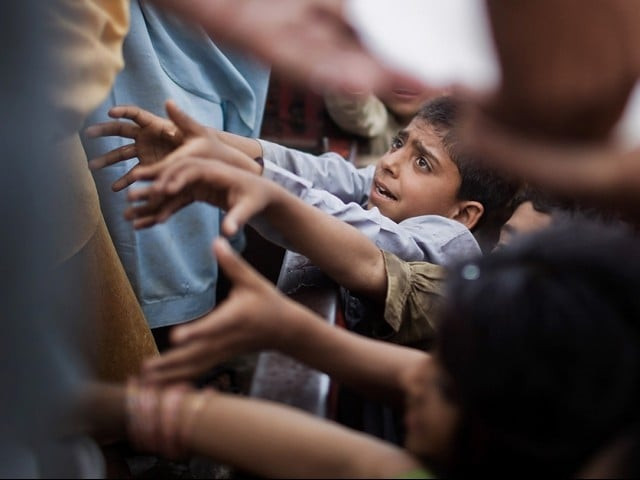Hunger without fasting: Losing the essence of Ramazan
Pakistan ranks as 30 of 45 countries for its weak political and social measures to reduce hunger and under-nutrition

The World Bank President officially warned Pakistan against the prospects of a future where 45% of the workforce, that are under five years of age now could be stunted because of poor nutrition of their mothers. PHOTO: REUTERS
In the backdrop of this magnitude of spending, there are murmurs on Ehtram-e-Ramazan Ordinance 1981, the value of which seems nothing more than a political harassment tool. As reported in the media, just last week, there were protests in Sukkur and Jacobabad by religious political parties, against eateries that operate full-day despite the provisions of the Ordinance prohibiting them from doing so. Apart from political activism, citizens’ complaints have also driven state action to enforce this Ordinance – a clear indication of how energies are pooled together to hound the violators with the help of a police state. Incidentally, such enthusiastic collaboration is hardly visible when it comes to the enforcement of legislation related to fundamental rights.
30 fall unconscious after eating shawarma in Lahore
Ramazan’s obsession with food is toxic. When it comes in the form of so-called respect for the hungry and the feeling of hunger, it seeks to harass. When it is a celebrated commodity, it manifests itself in skyrocket prices, forcing the poor to (further) compromise their food intake. However, not once has this obsession translated into a policy or institutional action to launch a clamp down against hunger, food and nutrition insecurity – running completely in contradiction to the key message of the month.
In the past few years, hunger, food and nutrition insecurity as phenomena are making their presence felt in ugly forms of riots, killings and hints of a future where a sizeable proportion of the workforce will be represented by stunted individuals. The food riots of 2008-09 that claimed several lives, or the chaos over food distribution at various displaced persons camps set up after the military operations in parts of FATA, and floods in other parts of the country have repeatedly served as reminders of food insecurity translating in public unrest.
Under nourishment and food security along with state’s incapacity to execute an efficient institutional action to address, drought are also responsible for over 800 deaths in Tharparkar in the last two years alone. Early this year, the World Bank President officially warned Pakistan against the prospects of a future where 45% of the workforce, that are under five years of age now, could be stunted because of poor nutrition of their mothers. The National Nutrition Survey of 2011 states 58% of Pakistanis as food insecure.
Layyah shopkeeper killed dozens with ‘revenge’ sweets
It is strange that despite being faced with such challenges, food security at policy level represents the meekest of efforts. The Hunger and Nutrition Commitment Index by a similarly named initiative supported by international agencies ranks Pakistan as 30 out of 45 countries for its weak political and social measures to reduce hunger and under-nutrition.
Food security as a policy and institutional undertaking has been comprehensively reviewed by experts. These should be referred to for a better understanding of the subject. However there is generally a consensus that the food security measures in Pakistan, separately addressed by a set of legislation on food availability, accessibility, utilisation and livelihood generation, are pursued by factors other than a rights-driven approach. This is to support the constitutional provision of Article 38 or the Universal Declaration of Human Rights and other international treaties ratified by Pakistan. If evaluated against the basic definition of the right to food that emphasizes right to all nutritional elements a person needs to live a healthy and active life, and to the means to access them, state policies and actions do not reflect much seriousness.
Citizens’ initiatives to contribute to food access in the form of charity give-aways, donations for the likes of Sailani Welfare Trust and even at mazars help many find a meal. However, these are neither nutrition-focused, nor can these be termed as adequate or even entirely accessible. Not to mention the lack of checks on the quality of the food being distributed. During the floods of 2010, a number of displaced people staying at Karachi camps complained the Biryani being provided to them is contrary to their taste of basic, oil-free food they are used to in their villages.
Death toll from poisoned sweets climbs to 33 in Punjab
Those being severely affected by hunger and under-nutrition do not enjoy the kind of access and capacity that could compel political and policy actors to take their problem seriously. However, the month of Ramazan was supposed to act as a reminder of their plight and a time for action to change the equation. Instead, like every year, this year too it went wasted into excessive consumerism facilitated by a state eager to show it off as a mark of its good economic performance. Funnily, the same state has a stick for the “violators” offending those who keep hungry for 15 hours out of choice, and not because barriers to food access have forced them to.
Zeenia Shaukat is an independent professional. She works on rights-based research, advocacy, capacity building and media communications primarily on issues related to human rights, development, and social justice.



















COMMENTS
Comments are moderated and generally will be posted if they are on-topic and not abusive.
For more information, please see our Comments FAQ